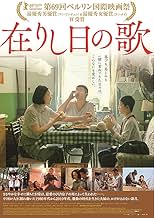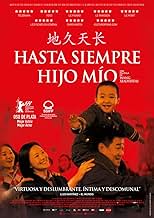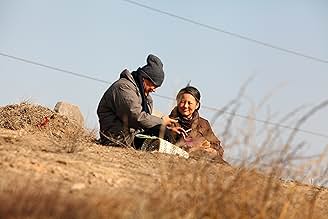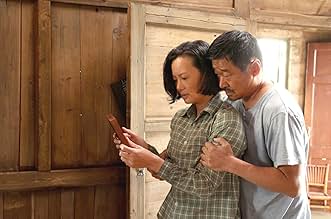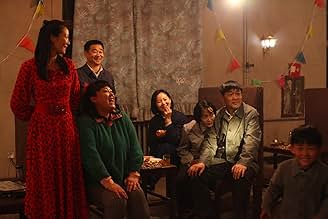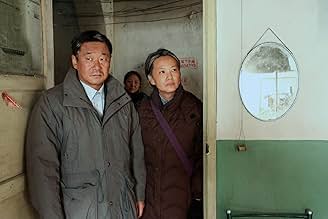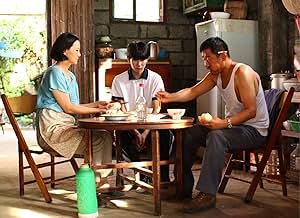IMDb RATING
7.7/10
5.9K
YOUR RATING
Two married couples adjust to the vast social and economic changes taking place in China from the 1980s to the present.Two married couples adjust to the vast social and economic changes taking place in China from the 1980s to the present.Two married couples adjust to the vast social and economic changes taking place in China from the 1980s to the present.
- Awards
- 43 wins & 60 nominations total
Yanguozhang Zhao
- Xinjian Zhang
- (as Yangouzhang Zhao)
- Director
- Writers
- All cast & crew
- Production, box office & more at IMDbPro
Featured reviews
What a beautiful story about what it means to be a parent in this world and how we are all connected.
The story is told by jumping back and forth in time, a flow of scenes giving the viewer a glimpse of the changes in the life of a couple who lost their son and how they try to move on with this loss. Although they abondon old friends after the incident a connection remains and in the end the lives of this group of people comes full circle.
This film brings the message of everyone being connected to another and the importance to sincerely care about others to the screen in such a wonderful way with an incredible cast. The three hours felt so short but something still remains, just like in life when one is touched by the goodness of others.
Highly recommend this movie.
The story is told by jumping back and forth in time, a flow of scenes giving the viewer a glimpse of the changes in the life of a couple who lost their son and how they try to move on with this loss. Although they abondon old friends after the incident a connection remains and in the end the lives of this group of people comes full circle.
This film brings the message of everyone being connected to another and the importance to sincerely care about others to the screen in such a wonderful way with an incredible cast. The three hours felt so short but something still remains, just like in life when one is touched by the goodness of others.
Highly recommend this movie.
In very many ways this film is almost a reboot of Zhang Yimou's film To Live, from 1994, which tells the many trials and tribulations of a family from the founding of the People's Republic in 1949 to the end of the Cultural Revolution in 1976. So Long My Son picks up that chronological baton, and tells a story about family bonds, the meaning of friendship and what constitutes our morals and ethics through the last 30/40 years of Chinese history, from a stilted, materially basic time of 1980 through to the hypermodernity of China in the 2010s.
In the same way To Live aimed thinly disguised critiques at the Chinese government's policies through showing its impact on ordinary people, So Long My Son fires a number of shots too and it's in fact a little surprising to me some of these have been overlooked by the censors. The most obvious of them is the criticism of the one child policy, but hidden in there too are mentions of the privatisation of state owned industries in the early 90s and the mass redundancies that went with them, as well as criticism of the wealth inequality of modern China that has ensued from the market economy transition of the 80s and 90s.
I'm unsure if this was a problem specific to the release version I saw, though I have seen other reviews saying the plot was hard to follow, but I noticed that the English subtitles was often only translating about 1/5 of the dialogue in Mandarin. As a speaker of both, I followed the plot and characters quite easily, but can absolutely understand why many reviewers and comments have said they found the characters and plots hard to distinguish if the subtitling was a problem. However, with one eye on the subtitles, I think the fact they were missing a lot of the Mandarin dialogue would have created a really dreamy plotline that complements well the cinematographic style deployed - long panoramic shots that suddenly cut into a character's perspective; languid sequences that soak in the environment; and shots designed to make the audience feel voyeurs in a private situation.
In the same way To Live aimed thinly disguised critiques at the Chinese government's policies through showing its impact on ordinary people, So Long My Son fires a number of shots too and it's in fact a little surprising to me some of these have been overlooked by the censors. The most obvious of them is the criticism of the one child policy, but hidden in there too are mentions of the privatisation of state owned industries in the early 90s and the mass redundancies that went with them, as well as criticism of the wealth inequality of modern China that has ensued from the market economy transition of the 80s and 90s.
I'm unsure if this was a problem specific to the release version I saw, though I have seen other reviews saying the plot was hard to follow, but I noticed that the English subtitles was often only translating about 1/5 of the dialogue in Mandarin. As a speaker of both, I followed the plot and characters quite easily, but can absolutely understand why many reviewers and comments have said they found the characters and plots hard to distinguish if the subtitling was a problem. However, with one eye on the subtitles, I think the fact they were missing a lot of the Mandarin dialogue would have created a really dreamy plotline that complements well the cinematographic style deployed - long panoramic shots that suddenly cut into a character's perspective; languid sequences that soak in the environment; and shots designed to make the audience feel voyeurs in a private situation.
This years we are witnissing something of a "Chinese new wave". "So long my son" was already the third Chinese film I saw this year (after "An elephant sitting still" (2018, Bo Hu) and "Long day's journey into night" (2018, Gan Bi)).
"So long my son" is the perfect sequel to "Lifetimes" (1994, Zhang Yimou). "Lifetimes" covers de period 1940 - 1970 in Chinese history and "So long my son" the period 1980 up till now. In "Lifetimes" the culrurel revolution is the most defining event, in "So long my son" it is the one child policy.
In "Lifetimes" the story is told in chronological order. "So long my son" jumps back and forth in time. Together with the many characters "So long my son" asks from his viewers that they keep paying attention. The one who does so is richly rewarded for this. Moreover the peculiar chronological order is in my opinion less artificial than in for example "Memento" (2000, Christoher Nolan). Some events in the film have such an emotional "gravity" that it is just natural that they disrupt the normal chronological order.
"So long my son" is in some ways critical to Chinese society. Apart from the one child policy and the damage it has done it shows the growing gap between rich and poor. The critisism mainly concerns however policies started by Deng Xiaoping. The widening of the distance between rich and poor is after all an indirect consequence of the open door policy (mixed state ruled and market economy) that was introduced in 1978.
"So long my son" says nothing about the surveillance state that Xi Jinping is building at the moment. Long it was thought that a more market oriented economy would lead by itself to a more liberal political system. This did not happen, and one can call that "The Chinese paradox". Now we have a smaller "Chinese paradox" in the movie industry, where the surveillance state does not preclude the already mentioned Chinese new wave.
"So long my son" is the perfect sequel to "Lifetimes" (1994, Zhang Yimou). "Lifetimes" covers de period 1940 - 1970 in Chinese history and "So long my son" the period 1980 up till now. In "Lifetimes" the culrurel revolution is the most defining event, in "So long my son" it is the one child policy.
In "Lifetimes" the story is told in chronological order. "So long my son" jumps back and forth in time. Together with the many characters "So long my son" asks from his viewers that they keep paying attention. The one who does so is richly rewarded for this. Moreover the peculiar chronological order is in my opinion less artificial than in for example "Memento" (2000, Christoher Nolan). Some events in the film have such an emotional "gravity" that it is just natural that they disrupt the normal chronological order.
"So long my son" is in some ways critical to Chinese society. Apart from the one child policy and the damage it has done it shows the growing gap between rich and poor. The critisism mainly concerns however policies started by Deng Xiaoping. The widening of the distance between rich and poor is after all an indirect consequence of the open door policy (mixed state ruled and market economy) that was introduced in 1978.
"So long my son" says nothing about the surveillance state that Xi Jinping is building at the moment. Long it was thought that a more market oriented economy would lead by itself to a more liberal political system. This did not happen, and one can call that "The Chinese paradox". Now we have a smaller "Chinese paradox" in the movie industry, where the surveillance state does not preclude the already mentioned Chinese new wave.
'So Long, My Son' made in 2019 by Xiaoshuai Wang and presented at the Berlin International Film Festival in February 2020 is proof that Chinese cinema is much more diverse and interesting than the mix of historical, martial arts or political propaganda movies that film lovers outside of China know superficially. It is a complex and ambitious film in itself, with a duration of 3 hours of projection, which is the first series of what is planned to become a trilogy that deals with the history of China and the impact of the great transformations that this huge country and its people has gone through in the last 40 years. On many respects the film is sincere and courageous in addressing historical processes and economic and social changes that have been paid for with a huge human price: the policies aimed at restricting families to at most one child per couple, and the transition from planned economy to capitalism market, with dramatic consequences in the lives of millions of Chinese workers who lost their dull but safe employment due to the closure or downsizing of state-owned enterprises, people forced to re-profile and migrate to ensure their livelihoods. The film's size and the ambitions of director Xiaoshuai Wang did not stop him from making a deeply human movie based on a well-written story anchored in China's recent history, with characters that viewers in China and anywhere else in the world can identify with.
We are following the saga of two families from northern China during over three decades, from the ideological relaxation and economic liberalization of the 1980s to the capitalist abundance and socio-economic inequalities of the present. The Liu and Chen families live in the same crowded house, they all work in the same factory, they are neighbors and friends, the two boys of the families were born on the same day and grew up as brothers. The two families symbolically represent different destinies in these times of change. The Liu family remains at the level of simple workers and then small entrepreneurs, they hardly survive the economic shocks that will cause them to migrate to the south of developing China but also a personal tragedy when their only child drowns. The Shen family is more adaptable, earlier the woman reaches a political leadership position, later they succeed economically and make a fortune. Although families break up to reunite only in the end, their destinies remain tied to a secret that cannot be forgotten or erased, perhaps only eventually forgiven.
The two actors who played the roles of the Liu couple impress with the depth, realism and sensitivity of performances. They also convinced the Berlin Festival jury, which awarded them both acting prizes, and I can understand the reasons. The tragedy of losing a child has been represented on screens before, but so far we have not seen such a deep interpretation of the consequences of the demographic policy of the only child at the level of the family cell. Those who see will hardly forget. Director Xiaoshuai Wang alternates the broad takes that describe the complex landscapes of a country in transformation and industrialization, with the intimate ones in the inhabited (but not private) spaces that become familiar to us in all details. Realism alternates with aesthetics and the results are remarkable. The props are chosen carefully, every detail counts. The makeup is perfect. If we pat attention we realize how the director visually expresses messages that he could not make explicit in words. For example, some of the factory-filmed scenes depicting the 1980s include an implicit critique of dullness of life, clothing uniformity and ideological regimentation. The narrative of the film is divided into two parts with different structures, which could belong to different movies. In the first two hours we reconstruct the story of the two families, the conflicts and their evolution in sequences of flashbacks that gradually compose the image and develop the characters. The last hour of the film describes the reunion that takes place in or near contemporaneity, and proposes a reconciliation and a resolution of conflicts. Personally, I liked the first part more, the solution in the end has something too idyllic and too forced which made it look not completely credible. I was left with the impression that Xiaoshuai Wang is a director of great strength and depth who when allowed to develop his artistic and historical vision can lead a movie to admirable results.
We are following the saga of two families from northern China during over three decades, from the ideological relaxation and economic liberalization of the 1980s to the capitalist abundance and socio-economic inequalities of the present. The Liu and Chen families live in the same crowded house, they all work in the same factory, they are neighbors and friends, the two boys of the families were born on the same day and grew up as brothers. The two families symbolically represent different destinies in these times of change. The Liu family remains at the level of simple workers and then small entrepreneurs, they hardly survive the economic shocks that will cause them to migrate to the south of developing China but also a personal tragedy when their only child drowns. The Shen family is more adaptable, earlier the woman reaches a political leadership position, later they succeed economically and make a fortune. Although families break up to reunite only in the end, their destinies remain tied to a secret that cannot be forgotten or erased, perhaps only eventually forgiven.
The two actors who played the roles of the Liu couple impress with the depth, realism and sensitivity of performances. They also convinced the Berlin Festival jury, which awarded them both acting prizes, and I can understand the reasons. The tragedy of losing a child has been represented on screens before, but so far we have not seen such a deep interpretation of the consequences of the demographic policy of the only child at the level of the family cell. Those who see will hardly forget. Director Xiaoshuai Wang alternates the broad takes that describe the complex landscapes of a country in transformation and industrialization, with the intimate ones in the inhabited (but not private) spaces that become familiar to us in all details. Realism alternates with aesthetics and the results are remarkable. The props are chosen carefully, every detail counts. The makeup is perfect. If we pat attention we realize how the director visually expresses messages that he could not make explicit in words. For example, some of the factory-filmed scenes depicting the 1980s include an implicit critique of dullness of life, clothing uniformity and ideological regimentation. The narrative of the film is divided into two parts with different structures, which could belong to different movies. In the first two hours we reconstruct the story of the two families, the conflicts and their evolution in sequences of flashbacks that gradually compose the image and develop the characters. The last hour of the film describes the reunion that takes place in or near contemporaneity, and proposes a reconciliation and a resolution of conflicts. Personally, I liked the first part more, the solution in the end has something too idyllic and too forced which made it look not completely credible. I was left with the impression that Xiaoshuai Wang is a director of great strength and depth who when allowed to develop his artistic and historical vision can lead a movie to admirable results.
Chinese film 'So Long, my Son' opens with Yaoyun and Liyun, a couple in an industralised town during the 1980s, suffering a great personal tragedy. Some years later they have left their hometown and are living with their son in a port. Some years later still and they are returning for the first time to their hometown in order to see a dying friend. The gaps in-between are filled in by multiple flashbacks, during which we see the human costs of China's environmentally-sensible one-child policy; how the authorities attempt to crush personal expression; and the ramifications of Yaoyun and Liyun's tragedy.
All these flashbacks are difficult to keep track of, especially as they are not in chronological order. So from that aspect this is a film that would probably reward repeated viewing. Certainly I would be happy to see it again; as played by Jingchun Wang and Mei Yong, respectively, Yaoyun and Liyun are a likeable couple. Their circle of friends may be less well-developed, consisting of stock characters such as the fun-loving party girl, the free spirit and the blindly-loyal Party functionary, but they all add colour to the story. I also enjoyed the depiction of China's transformation and development over the two decades covered by the film.
I saw this in the cinema during the 2019 London Film Festival. While I certainly recommend it, I suggest waiting until you can watch it in your own home: at three hours long you will want to be as comfortable as you possibly can be!
All these flashbacks are difficult to keep track of, especially as they are not in chronological order. So from that aspect this is a film that would probably reward repeated viewing. Certainly I would be happy to see it again; as played by Jingchun Wang and Mei Yong, respectively, Yaoyun and Liyun are a likeable couple. Their circle of friends may be less well-developed, consisting of stock characters such as the fun-loving party girl, the free spirit and the blindly-loyal Party functionary, but they all add colour to the story. I also enjoyed the depiction of China's transformation and development over the two decades covered by the film.
I saw this in the cinema during the 2019 London Film Festival. While I certainly recommend it, I suggest waiting until you can watch it in your own home: at three hours long you will want to be as comfortable as you possibly can be!
Did you know
- TriviaThe film explores the consequences across three decades of China's onetime one-child policy which lasted from 1979-2013.
- GoofsWhen Hao Shen's mother died, he wore a black cloth on his left arm. However, in most areas of China, especially in northern China, it is a folk custom for children to wear a black cloth on their right arm after the death of mother.
- ConnectionsReferenced in Estrenos Críticos: Septiembre 2019 (2019)
- SoundtracksAuld Lang Syne
Traditional tune, lyrics by Robert Burns
- How long is So Long, My Son?Powered by Alexa
Details
- Release date
- Country of origin
- Official sites
- Languages
- Also known as
- À bientôt, mon fils
- Filming locations
- Production companies
- See more company credits at IMDbPro
Box office
- Gross worldwide
- $8,096,596
- Runtime3 hours 5 minutes
- Color
- Aspect ratio
- 1.78 : 1
Contribute to this page
Suggest an edit or add missing content


![Watch Trailer [OVS]](https://m.media-amazon.com/images/M/MV5BZThlNmFjNjAtNjkwZS00NTU1LWJkM2ItZGIyNmVlZDRmMGM5XkEyXkFqcGdeQXRyYW5zY29kZS13b3JrZmxvdw@@._V1_QL75_UX500_CR0)
